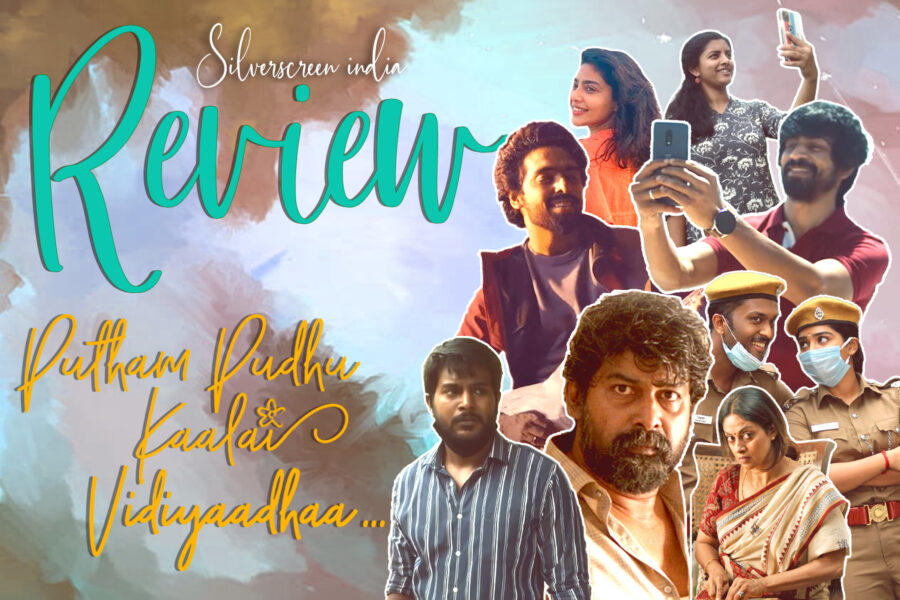Putham Puthu Kalai Vidiyaadha is a collection of five short films that draw from life in between two pandemic-induced lockdowns in India. Although it isn’t a great improvement on the previous pandemic-themed Tamil anthology, Putham Puthu Kalai Vidiyaadha features more grounded tales and a far more effective cast.
The best of the lot is kept for last. In Richard Anthony’s Nizhal Tharum Idham, the lockdown is psychological rather than physical. Aishwarya Lekshmi plays Shobi, a daughter who returns to her father’s house in Pondicherry after his sudden death. Her inability to mourn or move forward manifests in the film’s visual style. The camera, in uncomfortable mid-shots, breathes as she holds her gaze into the vacuum, curls up on her bed or tries to verbalise her feelings. The film has a good narrative rhythm. Shobi oscillates between meeting people and retreating to her solitary existence. Aishwarya is brilliant here. She internalises Shobi’s social disconnection and her struggles to break that inexplicable psychological wall.
The rest of the shorts in the anthology lack the grace and imagination of Nizhal Tharum Idham. For one, Balaji Mohan’s Mugakavasa Mutham (Kiss Over A Mask) is a feature film awkwardly compressed into a short, centred on archetypal characters. Gouri G Kishan plays a police constable who is the object of adulation and affection of a colleague (Teejay Arunasalam). They are in a state-imposed lockdown, but not physically separated. They flirt, aptly encouraged by their friends. The film uses a dull, hackneyed narrative device to bring them to that moment of admission of love. Every gesture and dialogue reeks of clichés. She rides a scooter into the frame, smiling at no one in particular, too pleased with herself, and every time an ambulance passes by, she stops to say a quick prayer. There is a short dance sequence where the cops are trying to make a PSA video on Covid, but the cheerfulness seems too made-up, too flat.
Balaji Mohan’s fixation with buoyant narratives resembles Halitha Shameem’s liking for stories about relationships mediated by technology. Loners, starring Lijomol Jose and Arjun Das, is a well-shot film about two strangers brought closer during the lockdown by video conferencing devices. The film is verbose. The conversations work when they touch the mundane and the intimate, letting the characters express their frustrations and grief. Then, the film steps into the social media zone, putting tweets and memes in the characters’ mouths. There is a lot of name-dropping of brands too. The film has a fantastic lead cast, especially Arjun Das, whose portrayal of a man who wants to connect with the world as much as he wants to stay away from it, is poignant. But once you are past the sparkling chemistry of the couple and the narrative possibilities the film plays with in its initial part, Loners is a clumsy, forgettable setup.
Madhumita’s Mouname Paarvaiyai is a love story too, about a married couple past their prime, who live under the same roof yet haven’t talked to each other in a long time after an ugly tiff. The film uses no dialogue, but there isn’t much on the screen to make up for the lack of it. The small-screen quality of the narrative is hard to overlook. The camera follows Nadhiya doing her daily chores. When she is wiping dust off a photograph of her playing the flute, an art she had to forgo post marriage, the film’s tone shifts to despair, as though someone pressed a switch. The mounting of tension inside the household is effectively conveyed through slick rapid cuts (editor TS Suresh) and impressive use of diegetic sound. The actors are good too. But Mouname Parvayaai suffers from predictability. If you did not know from the first few moments that the lockdown will bring the romance back to their semi-dead marriage, you haven’t seen enough movies.
Recommended
Surya Krishna’s Mask is, in large part, a motivational video. Arjun (Manikantan) wants to rent a flat where he can live with his boyfriend, Paul (Arun Kurien). But his nervousness about letting the world know about his sexuality causes a rift in his romantic life. Through a long-winded central scene featuring a conversation between him and his childhood friend, the film emphasises the importance of removing the masks people wear all their life. It is unimaginatively written and shot. The breaking of the fourth wall, a technique popularised by Fleabag, is wasted here, as the viewer feels no personal connection with the protagonist.
Indian anthologies on OTT platforms have been an exercise in mindlessly pouring money into India’s digital media sphere and expanding the content. The writers write, the actors act, but nothing lingers. Putham Pudhu Kalai Vidiyaatha, like its predecessors, touches upon contemporary issues, albeit carefully, without ticking any party off. Yet another 150-minute long visual work the viewer can fast-forward or consume in slices over a week.
*****
This Putham Pudhu Kaalai Vidiyadhaa review is a Silverscreen original article. It was not paid for or commissioned by anyone associated with the movie. Silverscreen.in and its writers do not have any commercial relationship with movies that are reviewed on the site.



